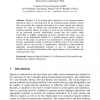Free Online Productivity Tools
i2Speak
i2Symbol
i2OCR
iTex2Img
iWeb2Print
iWeb2Shot
i2Type
iPdf2Split
iPdf2Merge
i2Bopomofo
i2Arabic
i2Style
i2Image
i2PDF
iLatex2Rtf
Sci2ools
HCI
2009
2009
Interpretation of User Evaluation for Emotional Speech Synthesis System
Whether it is for human-robot interaction or for human-computer interaction, there is a growing need for an emotional speech synthesis system that can provide the required information in a more natural and effective manner. In order to identify and understand the characteristics of basic emotions and their effects, we propose a series of user evaluation experiments on an emotional prosody modification system that can express either perceivable or slightly exaggerated emotions classified into anger, joy, and sadness as an independent module for a general purpose speech synthesis system. In this paper, we propose two experiments to evaluate the emotional prosody modification module according to different types of the initial input speech. And we also provide a supplementary experiment to understand the apparently prosody-independent emotion, or joy, by replacing the resynthesized joy speech information with original human voice recorded in the emotional state of joy.
Emotional Prosody Modification | HCI 2009 | Human Computer Interaction | Prosody Modification Module | Resynthesized Joy Speech |
| Added | 18 Feb 2011 |
| Updated | 18 Feb 2011 |
| Type | Journal |
| Year | 2009 |
| Where | HCI |
| Authors | Ho-Joon Lee, Jong C. Park |
Comments (0)

